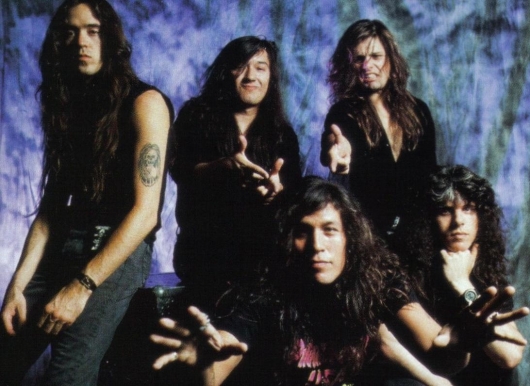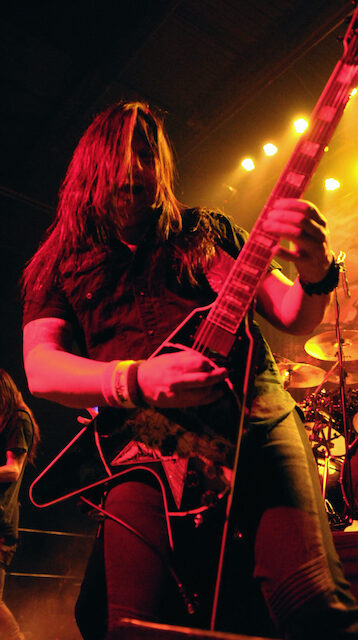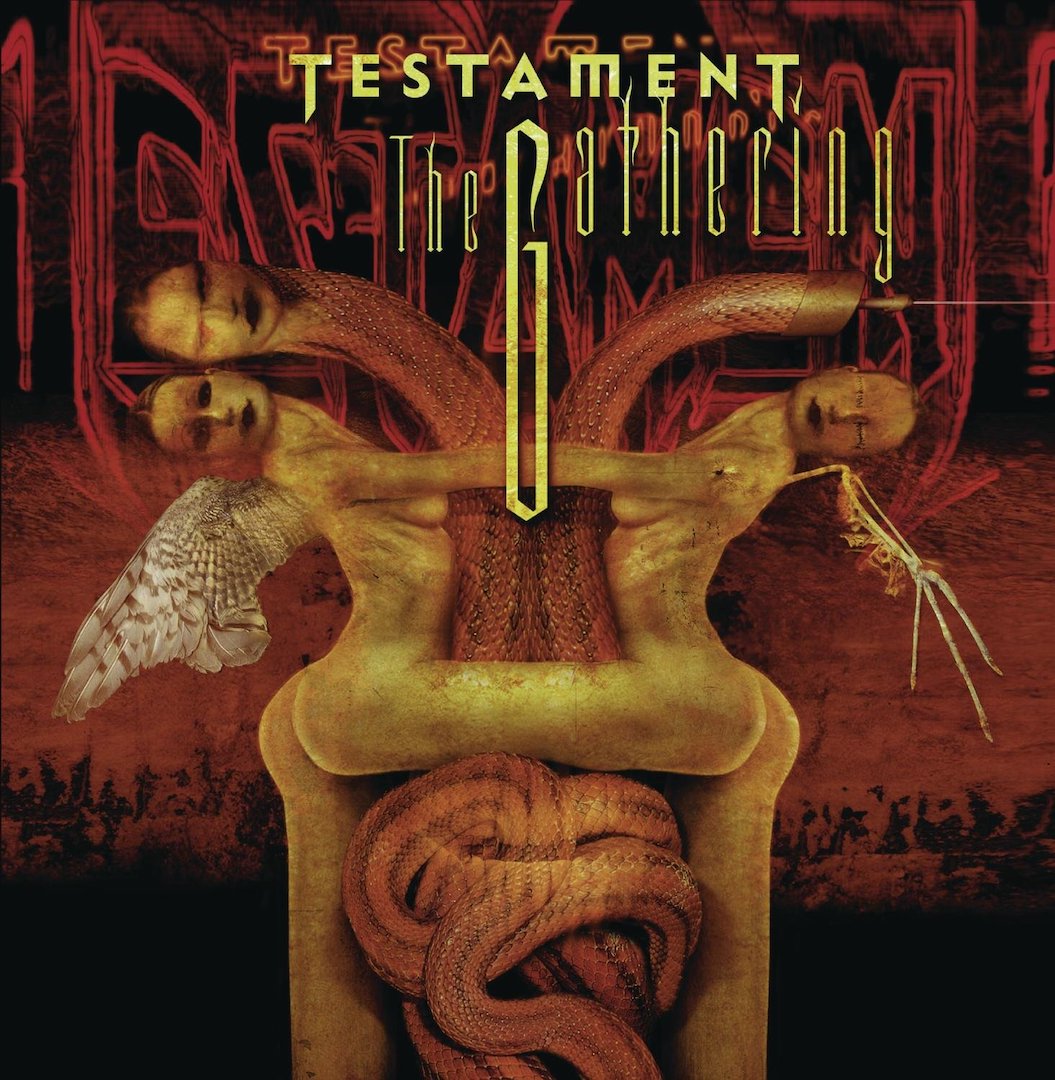
I don’t know about you, but I’m incredibly excited about the new Testament album. In case you haven’t heard about it, the band is set to release their new studio album, Titans of Creation, on April 3rd. The one track that’s already out is called Night of the Witch and it’s remarkable. It increased the hype for sure! It also reminded me of the sound of a different album: The Gathering. The 1999 classic is appreciated more today than it was when it was released, but it still remains underrated. I’ll write more about Titans of Creation when I’ve heard it in full. For now, I’d like to dedicate some time to one of my favorite metal albums.
Since the concept of an “underrated album” is subjective, let me define how I see it. I’ve written this before, but it bears repeating. I consider an album to be underrated when I don’t think it gets the praise it deserves. Or, in some cases, it does get some praise but it is overshadowed by a band’s other albums. Testament’s The Gathering, I think suffered from two things. It came in an era of line-up instability. And number two, certain different styles the band had experimented with in the previous albums alienated some fans. Therefore, some were not even paying attention anymore. It happens to many bands, unfortunately, and lots of gems remain overlooked.
Testament is one of the pillars of thrash metal. From their early days, they combined aggression, speed, and melody so well. I discovered them in the late ‘90s when I was getting into all these thrash bands. Just like Megadeth, Testament also stood out because the music was so brilliantly guitar driven with intense riffs and melodic solos. My introduction was Souls of Black, which some people don’t like but I love. How can you not love an album that has Seven Days of May in it? Then came the classics like Practice What You Preach and The New Order. I was becoming a fan.
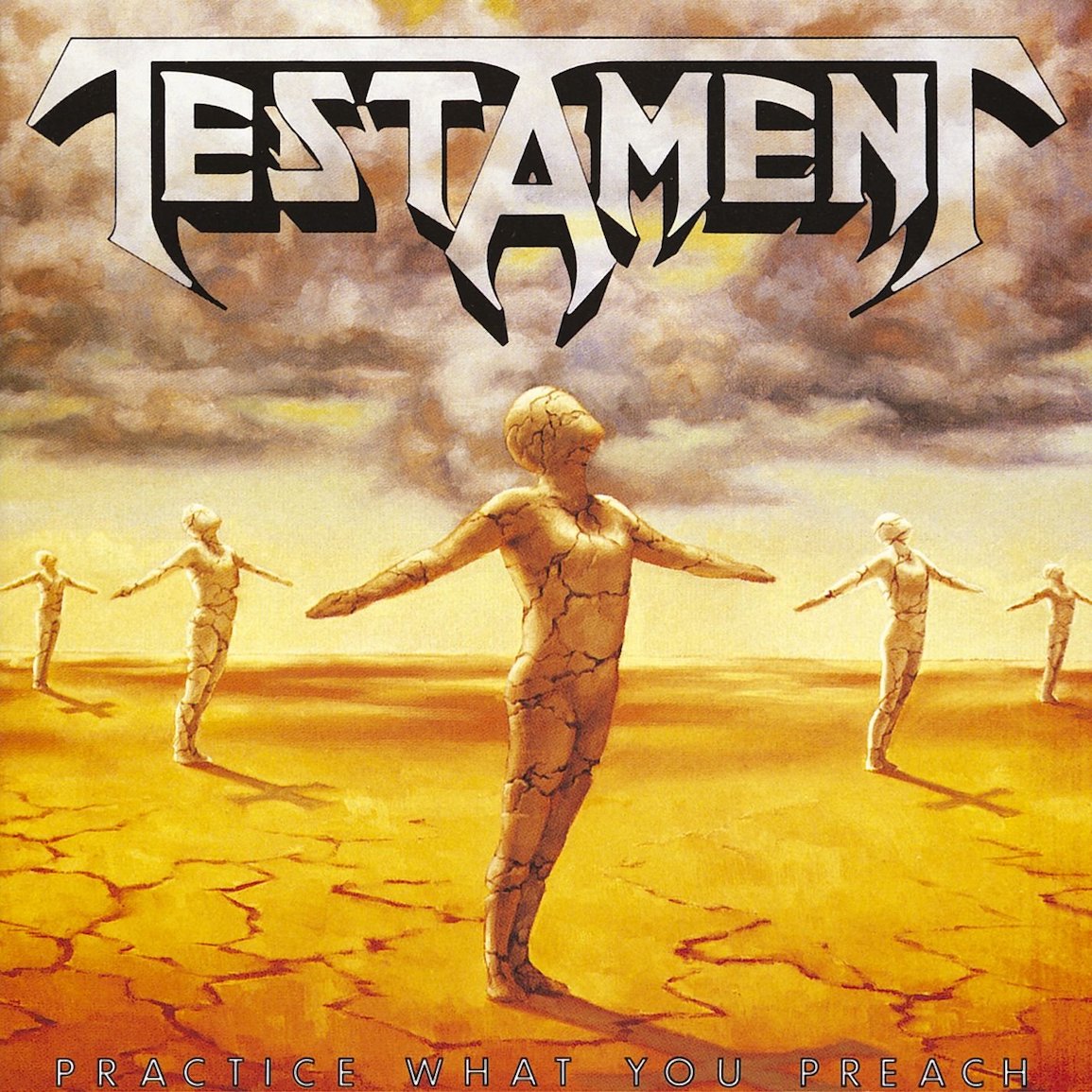
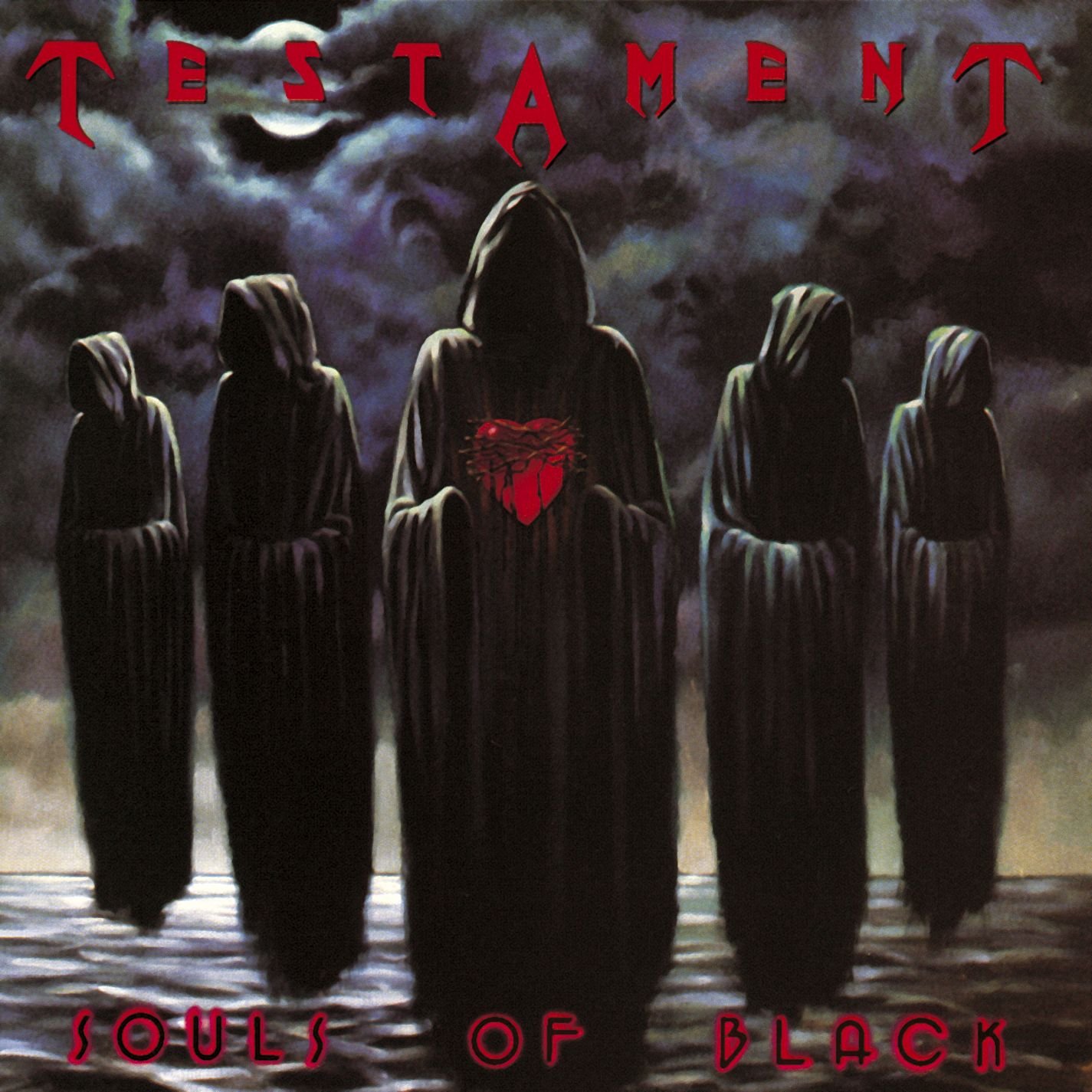
These early albums had Eric Peterson and Alex Skolnick on guitars, Chuck Billy on vocals, Louie Clemente on drums, and Greg Christian on bass. In 1992, the band released their last album with this group of musicians, The Ritual. It featured a more melodic style than was previously explored. But what came after its release was the shocking part. Founding members Alex Skolnick and Louie Clemente both quit the band. Alex, of course, has since re-joined the band. I don’t know much about what Clemente did after Testament, but some sources say he pursued a career outside of music. Skolnick had a different reason. He was a versatile guitarist who wanted to explore any kind of music he wished; something you can’t really do in a band environment. He released some fantastic music and collaborated with some phenomenal musicians during his time outside of Testament. And even though he’s back now and Testament’s commitments probably come first, he still performs with the Alex Skolnick Trio, Metal Allegiance, or any cool opportunity that comes his way.
But let’s go back to the ‘90s. The topic of how the metal landscape changed in the ‘90s has been beaten to death. So, I won’t delve too much into it. Suffice it to say thrash bands were now finding it difficult to reach the same kind of audience they once did. Depending on how big you were, you either tried to change a little to create a new group of fans and hoped the label would support your new direction; or you went with a smaller label – provided you could get out of your existing contract – but then you didn’t have the same kind of marketing resources at your disposal. I don’t know to what extent these things affected them, but you can’t imagine a world in which Testament remained unscathed from all these changes. Add to this the fact that they’d lost 2 founding members that fans loved. It wasn’t hard to envision some fan engagement going down.
The funny thing is, these changes pushed Testament in a direction that I’ve come to love and appreciate. They became more interesting to me. Don’t get me wrong, I love Souls of Black and Practice What You Preach. I like most of The Ritual too. But as much as Testament had its own sound, I don’t think they had truly found what made them unique. Eric Peterson, in particular, hadn’t yet discovered what he was truly capable of. Sure, he’d already had credits in writing some of the band’s most iconic songs, but was he really the riff-master as whom we know him today? I don’t think so. The ‘90s may have arrived and grunge may have become the king, but Testament wasn’t suddenly going to do grunge or pop-rock. No! They had a different idea. Something that pushed them to the heavier side of things… Something more groovy… Something that would allow Chuck to try different vocals… Something that would make people think The Ritual was released by a completely different band! Some call this the death metal era of Testament. I suppose you could see the elements, but I don’t think you can put a label on it. For me, it was all about the groove, Chuck’s harsher vocals, and Peterson’s riffs.
The first sign of this major change came with Low (1994). Honestly, I could write an entire “Underrated Albums” article about this one too. James Murphy assumed lead guitar duties and John Tempesta filled in as the drummer. Chuck was now adding growls into his vocals and, in some cases, even going with harsher vocals. What I can’t explain is, I’m not usually the biggest fan of harsh vocals. I prefer melodic vocals. But for some reason, I’ve always loved it when Chuck Billy sings that way. There’s something about the way he does it. It works!
A small side note here. There’s a Metallica tribute album called Metallic Assault. Chuck sings Seek & Destroy. You will hear his growls and the way he does harsh vocals. Sounds so good! I prefer this cover to the original, to be honest. Anyway, back to Testament…
Testament was now enjoying trying something different. 1997’s Demonic saw a band that embraced death metal elements a lot more. It was once again a divisive album. It still is to some extent. There are some good tracks, but I thought the songwriting on Low was much better. This one went a little too much in another direction and lost some of the groove and some of the speed.
At this point, the band was also going through line-up changes quite often. Demonic saw the departure of Greg Christian with Derrick Ramirez stepping in for bass. Gene Hoglan played drums. And Peterson was the sole guitarist except for some additional guitars from Glen Alvelais. But that didn’t last long. I don’t think Alvelais ever joined the band anyway, I think he just played on one song. Ramirez was replaced by Steve DiGiorgio. And when the band was looking for a drummer, they found a certain Dave Lombardo who was ready to get back into metal after not being in Slayer for a while! James Murphy, who’d played on Low, was also ready to contribute. With Low and Demonic under their belt, Testament was determined to end the decade with a bang. They were going to prove to the naysayers that they could make this new sound work.
In July 1999, we got The Gathering. No lie, I’m getting goosebumps just thinking of the first time I heard the opening track, D.N.R. (Do Not Resuscitate). That slow, eerie build-up and then that exploding riff… It was everything they worked towards in the ‘90s. It was finally there. D.N.R. is probably my favorite Testament song. By the time it’s done, you realize you could have easily kept listening if it was twice longer. It was fast, with an intricate riff. Lombardo’s drumming was the perfect complement to the music. Chuck had found his optimal vocal style. It sounded great! This album promised to be something special.
In general, the album had two main areas that allowed the songs to shine so well. One, the production was insanely good. I’m not talking about the remastered version, but the original release by Spitfire in 1999. It was sonically a great record. And two, the songwriting was streamlined. They didn’t bother trying to go for super long songs. I don’t mind longer songs when the song goes through changes, but if you’re just gonna repeat the same riffs, there’s no need. Testament did something smart. They wanted the songs to end while the riffs and grooves were still fresh in the listeners’ ears.
Down for Life, Eyes of Wrath, and True Believer are all incredible tracks to keep the album’s groove. They’re all very different. The heavier, groovier sound is there but each has a distinct song structure. That’s what I love about the album. Eyes of Wrath, in particular, is one of the best songs they’ve ever done. There’s some killer riffs in there, as well as some cool leadwork from James Murphy.
Three Days In Darkness has a great groove with a great section starting around the 1:40 mark. I think it’s what some songs on Demonic were trying to be. You can hear the evolution. With The Gathering, Chuck also found the optimal way to sing. The vocals are harsher than the early records, but it’s not on the Demonic level. It’s a style he’s kept since then, with some changes here and there. Legions of the Dead is a speedier track than most others, with an insane Eric Peterson riff. It’s a good mix of thrash and death metal. Careful What You Wish For could easily fit in one of the newer Testament records. Chuck goes back and forth between different vocal styles and the song keeps a good groove throughout.
Riding the Snake is one of the stars of the show. We start with a slower build-up but the song quickly gains pace. It reminds me of the early records but with a new guitar sound and vocal style. I think the bass playing is the secret ingredient of this track. It adds such a killer layer to the whole thing. The song also goes through quite a lot of changes and you can’t really know what you’re going to get next. Next, Allegiance is a fine song, I just didn’t think it made as big of an impact as the others on the record. There’s some great drumming from Dave Lombardo, though.
Sewn Shut Eyes has another cool riff with some of Chuck Billy’s harshest vocals on the album. Like I said, he makes it work! But the song is mainly about the riffs for me. They’re intricate but they work very well with the vocals. Nothing overshadows the other. That’s not always as easy as it sounds! I also love the melodic breakdown around the 2:45 mark. It’s one of the best songs on the album for me. And the album, at least the original release, ends with the thrashy Fall of Sipledome. It’s a magnificent track but what makes it truly great is the part right before the 3:00 mark. The song goes slower and we get some sweet leadwork from Eric himself. The later versions of the album got a bonus track called Hammer of the Gods, which was originally released as a Japanese bonus track. It’s a great instrumental and one of the best songs on the album. It’s remarkably different than everything else on the record; far more melodic with some amazing bass work from DiGiorgio. I’m glad it is on the newer versions for every to enjoy.
The entire album won’t be everyone’s cup of tea. If you are a fan of earlier Testament and you want cleaner vocals and far more melody, you won’t find it here. I get it, those early records are great. But other bands were doing similar ones to those. I’m not saying the same, I’m saying similar… But no one has done anything like The Gathering, not to my recollection. Not with those vocals, or those drums, or those riffs… That’s what I love about it. Something a band’s sound takes years to form. I think it’s natural. In my opinion, this is the definitive Testament record. Even with newer releases like The Formation of Damnation or Dark Roots of Earth, you still hear influences of the Gathering era. And it won’t ever go away.
One of the best things that came out of this era is the appreciation Eric Peterson got. I think he’s still underrated. He mostly played rhythm; and rhythm guitarists sometimes get overshadowed by the lead player. It’s not Alex Skolnick’s fault, of course! In fact, there is no “fault”. It just happens. But when you think about who contributes the majority of the riffs, who works on the songwriting more, who defines the band’s sound more, it’s Eric. In no way am I suggesting Skolnick doesn’t contribute to Testament’s sound. He’s one of my favorite players too and his lead playing played a large part in Testament carving their own path. However, it is also no secret that Peterson has contributed far more in songwriting. And when Alex wasn’t in the band, almost all guitar duties fell on Eric. Honestly, if it wasn’t for Eric and Chuck, there would be no Testament for Alex to return to. It’s just true… So, out of many things that make me love The Gathering, one is that people realized just how talented Peterson was in his own right. He could come up with some sick riffs and execute them flawlessly on stage too. He’s a great lead player too – he’s been playing more solos since the ‘90s and I’m glad. He and Skolnick have different styles that complement each other well.
So, there you have it! I think Testament is an underrated band in general. They’ve released some tremendous music through the years. I love the intensity of their work. But The Gathering is the quintessential Testament album. It defines their sound better than any other album can. It’s made such an impact that you still hear influences of it in their music. It is something that no other band could copy. It often gets overlooked. I think it should be celebrated. I certainly do. And I always will. Every time I listen to it…

